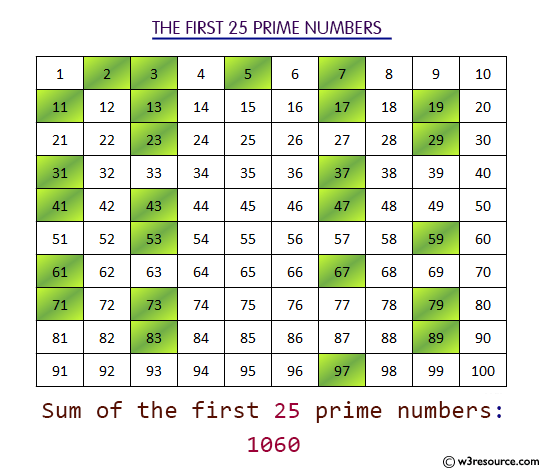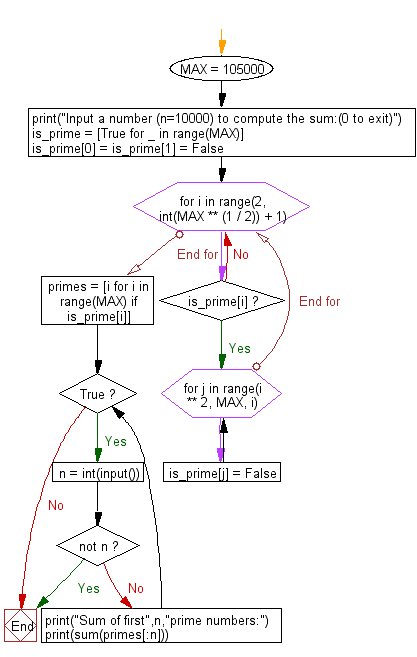Python: Compute the sum of first n given prime numbers
Sum of First n Primes
Write a Python program to compute the sum of the first n prime numbers.
Input:
n ( n ≤ 10000). Input 0 to exit the program.
Input a number (n≤10000) to compute the sum:(0 to exit)
25
Sum of first 25 prime numbers:
1060
Visual Presentation:

Sample Solution:
Python Code:
# Set the maximum limit for prime number computation
MAX = 105000
# Print statement to prompt the user to input a number (n≤10000) to compute the sum (0 to exit)
print("Input a number (n≤10000) to compute the sum:(0 to exit)")
# Boolean list to track prime numbers using the Sieve of Eratosthenes algorithm
is_prime = [True for _ in range(MAX)]
is_prime[0] = is_prime[1] = False
# Iterate through the range to mark non-prime numbers
for i in range(2, int(MAX ** (1 / 2)) + 1):
if is_prime[i]:
for j in range(i ** 2, MAX, i):
is_prime[j] = False
# Create a list of prime numbers within the given range
primes = [i for i in range(MAX) if is_prime[i]]
# Infinite loop to continuously accept user input until 0 is entered
while True:
# Prompt the user to input a number
n = int(input())
# Check if the entered number is 0, and exit the loop if true
if not n:
break
# Print statement to display the sum of the first n prime numbers
print("Sum of first", n, "prime numbers:")
# Calculate and print the sum of the first n prime numbers using list slicing
print(sum(primes[:n]))
Sample Output:
Input a number (n≤10000) to compute the sum:(0 to exit) 25 Sum of first 25 prime numbers: 1060
Explanation:
Here is a breakdown of the above Python code:
- First the code sets the maximum limit for prime number computation (MAX).
- It initializes a boolean list (is_prime) to track prime numbers using the Sieve of Eratosthenes algorithm.
- The code creates a list of prime numbers (primes) within the specified range.
- It enters an infinite loop to continuously accept user input until 0 is entered.
- Inside the loop, it prompts the user to input a number (n) and calculates the sum of the first n prime numbers.
- The loop exits if the entered number is 0.
Flowchart:

For more Practice: Solve these Related Problems:
- Write a Python program to compute the sum of the first n prime numbers using the Sieve of Eratosthenes for efficiency.
- Write a Python program to calculate the sum of the first n primes and validate the result with a recursive prime-checking function.
- Write a Python program to continuously add prime numbers until the cumulative sum exceeds a given threshold.
- Write a Python program to implement memoization in computing the sum of the first n prime numbers for repeated calls.
Go to:
Previous: Write a Python program to find the difference between the largest integer and the smallest integer which are created by 8 numbers from 0 to 9. The number that can be rearranged shall start with 0 as in 00135668.
Next: Write a Python program that accept a even number (>=4, Goldbach number) from the user and create a combinations that express the given number as a sum of two prime numbers. Print the number of combinations.
Python Code Editor:
Have another way to solve this solution? Contribute your code (and comments) through Disqus.
What is the difficulty level of this exercise?
Test your Programming skills with w3resource's quiz.
